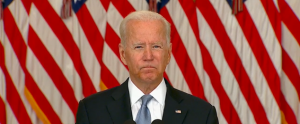
ABC News: The U.S. is suspending security assistance to Pakistan “until the Pakistani government takes decisive action against [terror] groups including the Afghani Taliban and the Haqqani Network,” State Department spokesperson Heather Nauert said Thursday.
The move comes after President Trump ramped up his criticism of the difficult American ally in a series of tweets earlier in the week, accusing Pakistan of giving the U.S. “nothing but lies & deceit.”
The State Department declined to provide a total amount of assistance being suspended– but this new announcement is in addition to $255 million in foreign military assistance the U.S. suspended on August 31. Those funds — essentially money that the U.S. provides to Pakistan to purchase American military equipment — remain suspended, in addition to past years’ foreign military assistance that are now suspended as well.
In addition, the Pentagon will suspend further military reimbursements to Pakistan as part of its Coalition Support Fund, a program that reimburses U.S. allies for costs they have incurred in counter terrorism and counter insurgency operations. In fiscal year 2016, that figure totaled $550 million — although Defense Secretary James Mattis withheld $50 million of that money in July, citing the same difficulties securing Pakistan’s cooperation.
The Pentagon’s budget for fiscal year 2017 provides up to $900 million for Pakistan in the Coalition Support Fund, although the final amount depends on how much Pakistan requests, according to Pentagon spokesperson Cmdr. Pat Evans.
So, in addition to the $255 million already suspended, the total amount of U.S. aid that could be frozen could top $1 billion.
ABC News first reported the decision had been made on Wednesday, after State Department officials called members of Congress to brief them of the decision.
But to critics, the announcement seemed to come quickly on the heels of the president’s pronouncement Monday on Twitter where he charged that Pakistan has taken “more than 33 billion dollars in aid over the last 15 years” and in return provided “safe haven to the terrorists we hunt in Afghanistan, with little help.”
Pakistan is a key partner in the fight against terrorism, but the U.S. has also accused it of supporting and providing safe haven to terror groups like the Haqqani Network, an independent division of the Taliban responsible for multiple attacks in neighboring Afghanistan over the years.
“No more!” Trump vowed on Monday.
But senior State Department officials deny that the announcement was done quickly to make policy out of the president’s tweet.
“It had always been our intention to evaluate on an ongoing basis Pakistan’s responsiveness to our request for support of the South Asia strategy and as we evaluated, if we felt that Pakistan was not addressing the request that we had made, that we would take further actions to put pressure on Pakistan or to underscore our dissatisfaction with their lack of responsiveness,” one senior official told reporters.
In real terms, the decision means that the U.S. will now not deliver military equipment or transfer security-related funds, unless required by law or if deemed in U.S. national security interests, Nauert said during the State Department’s briefing Thursday. But she and two senior State Department officials stressed that the suspensions were not permanent — with the possibility of Pakistan earning the funds back if it takes steps to show cooperation.
The State Department declined to say whether anyone in the administration called the Pakistani government to tell them this news, citing “private diplomatic conversations” — but one senior official said Pakistan was briefed “in general terms,” adding later, “When we talk to Pakistan, we will provide the information they need to be able to evaluate this.”
But it is “something that should not come as a surprise to Pakistan,” Nauert also said, because President Trump, Secretary of State Rex Tillerson, and Secretary Mattis have all had conversations with Pakistani leadership about this concern — and because Trump laid it out in his South Asia strategy speech on August 21.
“We have been paying Pakistan billions and billions of dollars at the same time they are housing the very terrorists that we are fighting, but that will have to change, and that will change immediately,” Trump said at the time.
Two months later, however, Trump praised Pakistan with a tweet, writing, “Starting to develop a much better relationship with Pakistan and its leaders. I want to thank them for their cooperation on many fronts.” The message came on the heels of Pakistani security forces helping secure the release of American Caitlan Coleman, her Canadian husband Joshua Boyle, and their three children from Taliban captivity.
When asked by ABC News Thursday what changed, Nauert said, “I don’t know that anything necessarily changed,” just that Pakistan must do more.
One senior State Department official was slightly more pointed: “They have not made decisive action on our requests, so the decision was made to take this step as one step to indicate that we cannot continue business as usual with the Pakistani government if they’re not going to be a partner with us.”
The danger in Thursday’s move is that instead of incentivizing Pakistan to better cooperate, it could further alienate the unsteady ally and push them into the arms of a neighbor like China, which has growing financial and diplomatic ties to Pakistan.
“Both countries are committed to this relationship, and we’re doing our best — both countries are doing our best to try to move the relationship forward and put it on more positive footing,” the senior official said, arguing that China and Pakistan’s “relationship has never come at the expense of U.S.-Pakistan relations.” In particular, the official cited the U.S.’s superior military capabilities that it can sell to Pakistan — sales it is now suspending.




